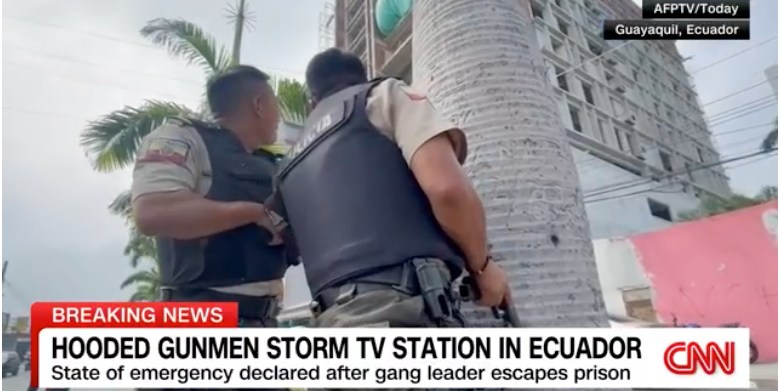The world was shocked in the last few weeks as drug gangs turned Ecuador from being a relatively stable, increasingly democratic Andean republic, into an apparent narco-state.
Ecuadorians are, for the first time, seeing their country fall under the control of criminal gangs, a fate previously only reserved to some of its other Latin American neighbors.
The recent surge seemingly started on August 9 last year, when Fernando Villavicencio, a presidential candidate outspoken about gang violence and corruption, was murdered by cartel hitmen in Quito, the national capital.
By that time, Ecuador was experiencing a surge in gang activity and violent crime, seeing its homicide rate go from 5.84 per 100,000 in 2017 (on the lower-end in the region) to 25.9 per 100,000, according to last year’s data, with that number likely to increase in 2024, according to Ecuadorian police that project a 66 percent hike in homicides this year. Ecuador is on the verge of surpassing all other South American nations’ homicide rates — with Colombia now set for second place — all in record time.
On October 15, Daniel Noboa, a former banana tycoon now president of the country, was elected on a platform centered around “fixing” gang violence in Ecuador. With 87 percent of Ecuadorians perceiving a rise in gang violence, and most cities now facing daily gang conflicts, a solution couldn’t come any quicker. However, soon after taking office, Noboa quickly declared a “state of exception,” suspending civil liberties and due process in favor of bolder police and military action.
In the last week, two major gang leaders have escaped from prison, Alfoso Macias of the Los Choneros gang, and Fabricio Colon Pico of the Los Lobos group, both major gangs within Ecuador. This week, criminals armed with grenades and firearms took a TV crew hostage in their studio, at the same time that prison guards and police officers were also taken as hostages by a drug gang in another part of the country.
In response, Noboa declared the situation an “internal armed conflict” and deployed the Ecuadorian military in the streets and expanded the security state’s powers to “fight” gangs.
So, why is gang violence surging, and why doesn’t a war against the cartels work?
The ongoing criminal crisis in Ecuador is, first and foremost, a direct result of the always-rising demand for drugs in (mostly) rich countries. As long as there is demand for drugs, and those drugs remain illegal, there will be gangs willing to provide them. Consumption of illicit narcotics has been increasing since the start of the war on drugs more than 50 years ago, and, with demand comes supply. In Mexico and Bolivia, for instance, the growing U.S. demand for heroin and cocaine led to the quick rise in poppy cultivation and heroin and cocaine production. If that demand is not addressed, it will keep rising, and drug cartels will keep producing.
Second, there is an observable balloon effect. As gangs from Colombia, Mexico, Brazil, Venezuela, and other neighboring countries were pushed out by dwindling local drug markets, competing gangs, and government actions, a significant portion has ended up in Ecuador, which was, until somewhat recently, very much untouched by major drug cartels. For example, the notoriously violent Venezuelan Tren de Aragua gang, began popping up in Ecuador in the last year. The same has happened with Mexican and Colombian gangs now in Quito and Guayaquíl.
Another impact factor is the militarized approach to the “war on drugs” itself. Violence begets violence, and, unfortunately, Noboa's state of exception may just make things worse. Noboa’s predecessor, Guillermo Lasso, pushed for police and military intervention against drug gangs, leading to more gang breakups and further violence. Embracing a violent approach will only create more narco gangs, as they encourage drug gangs to split up and engage in direct confrontations with the state and other gangs.
By doing so, Noboa embraced demonstrably failed policies of some of his predecessors and contemporaries. These include Felipe Calderón in Mexico, Álvaro Uribe in Colombia, and Jair Bolsonaro in Brazil. All of them expanded police and military powers against drug gangs while facing a surge in violence, only to see that violence and insecurity increase as a result of their policies.
These policies have left millions dead and displaced in the last five decades, while the region continues to be taken hostage by drug gangs, as quality of life and civil liberties dwindle.
If governments are unable to address the root cause of gang formation, namely socio-economic conditions and the demand for illegal drugs in wealthier countries, drug gangs will continue to develop. As more gangs develop, the government will respond with more violence and the suspension of liberties, leading to more deaths and repression. The root causes won't be addressed, and the cycle will repeat itself.
Sadly, with no sign of Noboa or any major politician in Ecuador being willing or able to change their approach, the cycle of violence will likely continue, if not escalate.














